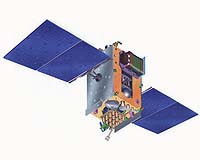 |
Washington DC (VOA) Apr 19, 2010 Space experts say the White House's new plan for space exploration is a boost to private companies that are developing cutting-edge technologies needed in coming years. New funding may propel research and create thousands of new jobs. When President Barack Obama spoke this week at Kennedy Space Center in Florida, he wanted to assure NASA veterans that he is committed to human space flight. With only three space shuttle flights remaining, critics have said it could be decades before the U.S. space agency can develop a vehicle to take its place. But the president said he hopes to see bold new missions, including trips to nearby asteroids and Mars, during his lifetime. He said a key to that goal is encouraging private companies to develop new technologies and operate cargo flights and manned missions into space. John Logsdon, a member of NASA's advisory council, says the private sector has been waiting for that kind of message. "This approach is a signal to the private space community that they can look to government partnerships, government as a user, or even government as an investment partner as they go forward," he said. One private partner may be the Space X company, founded by Internet entrepreneur Elon Musk. On his trip to Kennedy Space Center, President Obama met with Musk and visited the company's Falcon rocket, which is set for a test launch next month. So far, Space X and other private firms have relied on private money. But the president's new plan includes $6 billion to fund research and development into new rocket engines and other components. That funding is a major turnaround in the U.S. space budget, says John Gedmark of the Washington-based trade group Commercial Spaceflight Federation. "Technology development funding had pretty much been zeroed out under the previous plan," he said. Gedmark says a privately funded study shows that an increase in NASA's budget this year will create nearly 12,000 new jobs. He says new funding for private space firms will create even more jobs. Critics of the president's new approach say it is a mistake to rely on private space companies, because it could take years for them to develop a rocket capable of carrying astronauts. Once the space shuttle is retired this year, the only way to get astronauts into orbit will be aboard Russian Soyuz rockets. Under current plans, NASA has agreed to pay Russia to send U.S. astronauts on missions, including trips to the space station. Supporters of the president's new plan say the U.S. should encourage private firms to help share that role with Russia. Norm Augustine recently led a panel of space experts that reviewed U.S. space plans. "The question arises: do we have less faith in the U.S. aerospace industry to carry our astronauts to orbit, than we have to the Russian space industry to carry our astronauts to orbit?" Experts agree that the space race between the United States and the former Soviet Union is over, and space missions depend more and more on international cooperation. John Logsdon says President Obama's new space plan is a challenge not just to U.S. firms, but to space programs in other nations. "Countries around the world will have an opportunity to get involved in this. It is not a U.S. only undertaking like Apollo was," he said. Logsdon says Europe, Russia and Japan will continue to play key roles, as they do on the International Space Station. But fledgling space programs in India, China and Brazil may also join with the United States to explore space beyond the Earth's orbit.
Share This Article With Planet Earth
Related Links - Rocket Science News at Space-Travel.Com
 GSAT-4 Rocket Lost, But Precious Payload Safe
GSAT-4 Rocket Lost, But Precious Payload SafeBangalore (IANS) Apr 19, 2010 A fateful but providential decision by the Indian Space Research Organisation (ISRO) saved a precious Indo-Israeli science payload from crashing into the sea in the failed GSLV launch mission Thursday. Under the original plan, the ultraviolet telescope called TAUVEX was to be carried by GSAT-4, which plunged into the Bay of Bengal after the indigenously built cryogenic stage failed to fire ... read more |
|
| The content herein, unless otherwise known to be public domain, are Copyright 1995-2010 - SpaceDaily. AFP and UPI Wire Stories are copyright Agence France-Presse and United Press International. ESA Portal Reports are copyright European Space Agency. All NASA sourced material is public domain. Additional copyrights may apply in whole or part to other bona fide parties. Advertising does not imply endorsement,agreement or approval of any opinions, statements or information provided by SpaceDaily on any Web page published or hosted by SpaceDaily. Privacy Statement |